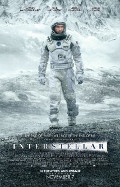
Directed by
Christopher Nolan
169 minutes
Rated M
Reviewed by
Andrew Lee

Interstellar
Synopsis: Earth is dying and strange beings are communicating with us. So Cooper (Mathew McConaughey) and a group of scientists go in search of a new planet for humanity to escape to.I can’t really talk about what I think of Interstellar without getting into a lot of detail, so here’s my short review: Overlong, plodding in the first half and a bit flat but intriguing in the second. It somehow kills any sense of awe or wonder despite showing you grand vistas of space, and by attempting to explain everything manages to tie itself in knots by the end. But, it has the most incredible robot designs I’ve ever seen on screen. And like all Nolan films, despite being disappointing it’s still watchable.
So now I’m going to dig in, be warned.
I’ll start with the good. Interstellar looks good, and once it leaves behind an incredibly dull first act and actually gets into space, it rocks along happily. The film delights in playing with the twin paradox, the effect of time dilation when travelling close to the speed of light. There are some interesting moments in the second act where time itself becomes a resource like fuel. It’s an interesting idea represented in an interesting way. And the robot design is genuinely amazing. It’s a nod to the Monolith of 2001, but unlike other references to that film, Interstellar makes this one its own. TARS is the most endearing and surprising character of the entire film. A sarcastic rectangular slab of metal, able to reshape itself into any number of oblong combinations, I could easily watch a film about one of these machines exploring the far reaches of space. I think the robot design was a stroke of genius.
But on to the bad, which outweighs the good in my find. Firstly there’s the awful first act. While there are some good moments, it’s an overlong introduction to a future that’s given up on technology because the Earth itself has given up and is dying from some kind of plague that’s destroying food crops. There’s a lot of time wasted on plodding vignettes that don’t add much to the plot and just fill out the already over-long runtime. My advice would be to enter the cinema maybe 40 minutes after the start. You won’t miss much, and the key moments begin around there anyhow.
And while time dilation is given an interesting spin in the middle of the film, the end wallows in sentimentality. Cooper is miraculously re-united with his daughter, Murph, now a very old woman whilst he is still young and healthy thanks to the wonders of relativistic space travel. She tells him she’s about to die, so he should leave her to her family. They’re his family too, but given the time dilation effect they’re strangers who, bewilderingly, show no interest in him. So rather than explore this, Cooper is cast out and told to seek out Amelia (Anne Hathaway), his fellow explorer who is setting up a colony of fertilised human ova on a faraway planet and is “waiting for him”. It’s meant to be a grand moment of romance and human drama, but there are a few problems. Firstly, Murph has no way of knowing that Amelia is even alive, let alone if she has any kind of feelings for Cooper. So immediately the film signals to us that this is a confected plot moment. Second, Cooper is a pilot with recent experience of relativistic travel. And now he’s being asked to pass through a wormhole, navigate to a planet on the other side, past a black hole, and hope that time has stood still. It’s a bit of a crapshoot whether Amelia will be the same age or a corpse long-buried by her artificially-gestated colonists. It doesn’t make a whole lot of sense except as a crowd-pleasing “emotionally uplifting” resolution. That the film is willing to sacrifice narrative logic to get you there comes across as hopelessly manipulative, and it just annoys.
We get long speeches about the importance of love, of how emotional connection is the lifeblood of humanity, but the film is oftentimes so cold and stilted that you have a hard time buying into it. Especially when the speeches are so trite. The main theme concerns Cooper leaving his family on Earth in the hope that he can find somewhere for them (and the human race) to live. But whilst Jessica Chastain as the adult Murph does a good job of portraying someone with abandonment issues, the emotional connections never quite line up. Ironically, the most interesting and emotionally-genuine relationship in the entire film is between Cooper and TARS.
My main complaint however is that for a film that starts off about the importance, awe and wonder of space, Nolan’s film is remarkably earthbound, like a prosaic version of Kubrick’s 2001. And make no mistake, they want to go there. The parallels aren’t just visually obvious (falling into a wormhole is like entering the monolith), they’re also blared in your ear. I have a new definition of hubris: playing the last three seconds of Also Sprach Zarathustra to signal all the “key” moments in your plot, I mean, really. If you’re going to steal 2001’s signature sound, you’d better come with the goods. And Interstellar doesn’t.
Interstellar is a film filled with interesting ideas: humanity’s extinction, relativity, the will to survive, how to survive, and the ties that bind. And at the end of the film they’re still ideas that await someone to do something with them. It’s not a completely awful film, just a disappointing one.

Want more about this film?


Want something different?




